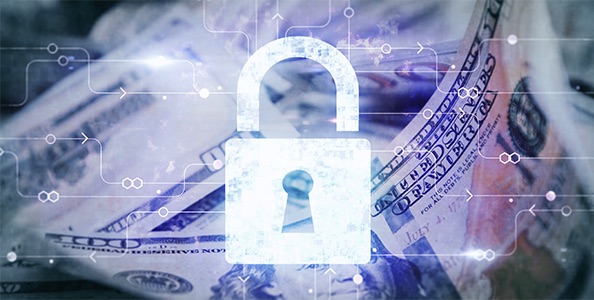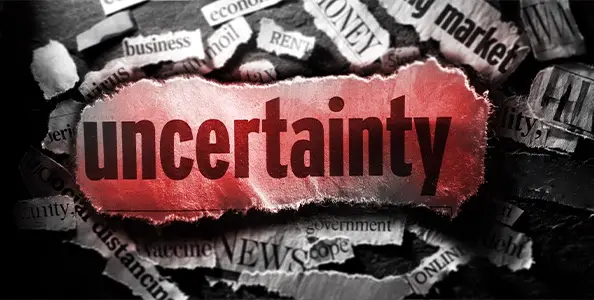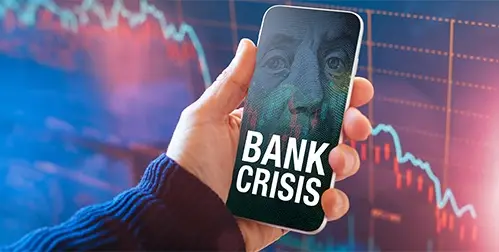- As traders grow optimistic for rate cuts, economists are warning investors to “be careful what they wish for”
- Historically, steep rate cuts occur only after the economy has taken a serious downturn
- Gold is positioned to rise in the case of recession and interest rate cuts
Misplaced Optimism for Rate Cuts
The Federal Reserve is marking a year since pausing rate hikes at 5.25% to 5.5%. As the Fed awaits signs of sustained cooling inflation, investors are growing optimistic for cuts. But some analysts are warning: be careful what you wish for. Historically, rate cuts come at the cost of economic downturn.
According to the CME FedWatch tool, investors are expecting one or two cuts to come in 2024. Deutsche Bank’s Jim Reid noted that this would the eighth time that traders bet on aggressive rate cuts – cuts that never materialized. Traders may again be jumping the gun betting on large interest rate cuts between now and the end of the year. They are pricing in 175 basis points cuts over the next 18 months. 1
Going from being on hold for more than a year to such drastic cuts means something has gone terribly wrong with the economy. With one exception, the Fed has only cut that deeply when the country was in the throes of recession. Only in the wake of the dot-com bubble deflating in early 2001 and the onset of the financial crisis in September 2007 did the Fed deliver half-point reductions. 2
.
 3
3
George Goncalves is the head of US macro strategy at MUFG. He expects the economy to weaken by September, which could lead the Fed to take early action.
“This idea of slow and steady cuts makes no sense given how data is shaping up,” Goncalves said. “The longer you wait, the more you may need to do later.”4
Federal Chair Powell has signaled an intention to cut rates. Yet, the Fed does not want to look like they are panicking though. They point to continued growth and consumer spending to “remove the urgency” to act. Economists at LH Meyer, a policy analysis firm, said the current state of the economy does not justify rapid easing. Instead, officials are more likely to do small cuts at each Fed meeting.
Be Careful What You Wish For
“Black swan” investor Mark Spitznagel is urging caution. His firm, Universa Investments, is known for positioning itself to gain on unpredictable black swan events. The fund pulled a 4,144% return on its investments during the pandemic stock crash. He shares the belief that the Fed is only likely to cut rates when the economy is slammed with recession and the market is falling.
“Be careful what you wish for,” Spitznagel said. “People think it’s a good thing the Federal Reserve is dovish, and they’re going to cut interest rates … but they’re going to cut interest rates when it’s clear the economy is turning into a recession, and they will be cutting interest rates in a panicked fashion when this market is crashing.”5

The current higher-for-longer rates still threaten to spark a downturn. Spitznagel said today’s markets are a “mega-tinderbox-time bomb.” The potential for a crash is large because of the massive debt acquired when interest rates were ultra-low. He said the yearslong rally in the stock market amounted to the “greatest bubble in human history.” The impact of the bubble bursting would be extreme because the government’s $34 trillion debt would make it harder for them to intervene. 6
Conclusion
As traders, once again, get excited for significant interest cuts, analysts are advising caution. While a rate cut can be beneficial, it often signals deeper issues that could lead to significant market declines and earnings reductions. Historically, rate cuts occur after the country has entered recession.
Gold is positioned to benefit from both cases. Gold prices go up when interest rates are cut because lower rates reduce the opportunity cost of holding non-yielding assets like gold. And if cuts are taking place in response to recession, owning gold is advantageous because it retains its value and acts as a hedge against economic uncertainty. A Gold IRA can protect your portfolio from the impact of interest rates for the long term. Call us today to learn more at 800-462-0071.









 8
8

 4
4



 4
4